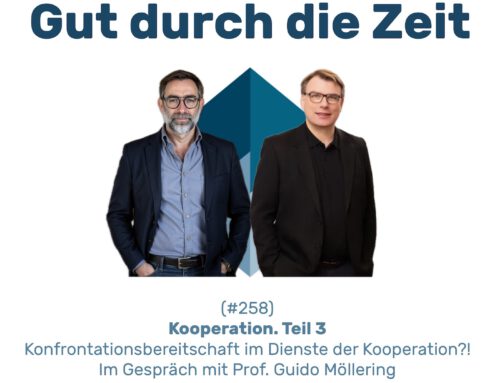INKOVEMA Podcast „Well through time“
#244 GddZ
Mediation in the face of the German Mediation Act
Does the Mediation Act help (organisational) mediators, does it get in the way or is it just there?
In conversation with Tilman Metzger
Lawyer, mediator of the first hour in Germany and passionate clarification helper; trainer for mediation and clarification help; co-founder of the Federal Association of Mediation; specialises in conflict management in organisations: Conflict management in organisations, associated with Sascha in the mediator pool of the Fraunhofer Gesellschaft.
Small series: Fields of mediation
Contents
Chapter:
detailed summary
This episode of the podcast "Gut durch die Zeit" is all about mediation work in the context of the Mediation Act, which has now been in force for several years and is influencing the way mediators work in organisations. Together with my colleague Tilman Metzger, I discuss the practical impact of the Act on our mediation activities and reflect on the changes we have observed in our practice.
We begin with an assessment of the fields of mediation in which we work, particularly within organisations. As mediators working in these areas, we have a special perspective on the role of the participants in the mediation process. Tilman shares his own experience that the Mediation Act has led to a greater awareness of mediation in organisations. Many HR managers and decision-makers are more aware of the possibilities and benefits of mediation, which has led to an increase in mediation assignments.
We go on to discuss the specific challenges associated with the Mediation Act, in particular the question of the voluntary nature of the parties involved. We emphasise the importance of developing a clearer definition of voluntariness in the context of organisations, as the reality is often more complex than the law might suggest. Tilman and I note that the perception of voluntariness in workplace mediation is often uprooted, as the decision to participate often arises from pressurised situations.
A key issue is the question of how the manager should be integrated into the mediation process. We argue that it is necessary to clarify the responsibility and role of managers within the mediation process. During the discussion, it becomes clear that the manager not only acts as a client, but also as part of the mediation process in order to promote a functional team climate.
Tilman shares his thoughts on different mediation approaches, such as clarification support, which aims for co-operation within the team! The variations in our practical approach make it clear that there are different ways in which mediators can act in organisations and how important it is that all parties involved pull together.
Finally, we discuss the lasting changes that the Mediation Act has brought about in practice and how mediators can reinterpret their role in a changing legal framework. The exchange between us also sheds light on the ambivalence and challenges in mediation and leaves room for further discussion on the Mediation Act and voluntary participation in such processes. If the topic is of interest to you, please share your thoughts and experiences with us to further the discussion.
Complete transcription
(AI-generated)





Leave A Comment